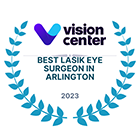
Dry eye syndrome is a group of symptoms caused by poor tear production. Not just made up of water, tears also contain mucus and oil that help lubricate and protect the surface of your eyes from injury or infection. When a person experiences dry eye syndrome, the symptoms may be difficult to notice, but can have an effect on their daily life. However, is that serious enough to see an opthamologist? Here’s when you should go to the doctor’s for dry eye symptoms.
Symptoms of Dry Eye
While the name “dry eye syndrome” may sound self explanatory, there are a whole host of symptoms you may experience including:
- Redness
- Grittiness with eye movement
- Sensitivity to Light
- Blurry Vision
- Eye fatigue
- Watery eyes (due to excess tears trying to correct the dryness)
- Contact lens discomfort
- End-of-day tension headaches
- Discomfort when wearing contact lenses
- A sense that something is in your eyes when nothing actually is
When Should You See a Doctor for Dry Eyes
You should visit an ophthalmologist for the above dry eye symptoms when the symptoms remain for extended times or get worse, you can’t determine the cause of your dry eye, or if they interfere with your daily tasks such as driving.
Dry eye syndrome has a variety of biological and environmental causes. It is more common in people over the age of 50, and hormonal shifts such as those that come with pregnancy, menopause, or as a result of hormonal birth control have been known to cause dry eyes as well. Additionally, those who spend their days in front of computer screens or in dry, windy environments can expect their work conditions to have an effect on their eyes.
At Home Treatments for Dry Eyes
If, however, your symptoms have not yet reached the point of needing to see an ophthalmologist, there are some steps you can take to combat your dry eye symptoms. Environmental factors like windy work conditions or daily computer use can be mitigated. For example, wearing sunglasses when outside doesn’t just protect your vision from the sun. If you think your dry eye is a result of a medical condition, however, you may want to try over the counter eye drops, sometimes called “Natural Tears”. Be sure to ask your doctor for what type they recommend and to read the ingredient list, as they can end up making your condition worse. Lasly, if these steps do not alleviate your symptoms within 7 days or your symptoms worsen, make an appointment with your eye care physician as soon as possible. There may be an underlying cause to your dry eye syndrome.
Dry eye syndrome has become more common over the last year. If you’ve been experiencing the symptoms of dry eye syndrome and they are interfering with your daily life, please contact your eye care physician for proper treatment.











.png)

